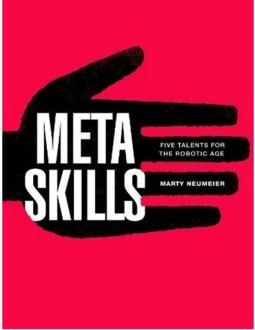| Metaskills, Five Talents for the Robotic Age |
|
Author: Marty Neumeier The back jacket of this book has the strapline “Help! A robot ate my job!”, and Neumeier’s idea that he wants to get across is that current employment problems aren’t a job crisis, but a talent crisis. Author: Marty Neumeier The first thing to say is that this is not a book about the skills you need to work with metadata, nor is it a book about the skills you need to develop and work with robots. Instead, it’s a book about the skills that separate people from machines. The back jacket of this book has the strapline “Help! A robot ate my job!” and Neumeier’s idea that he wants to get across is that current employment problems aren’t a job crisis, but a talent crisis. He says that technology is taking every job that doesn’t need a high degree of creativity, humanity or leadership, and that people need to stay ahead of the Robot Curve.
What you need to know about Neumeier is that he’s the Director of Transformation at a brand marketing agency called the Liquid Agency. However, and possibly in his favor, one of his other titles (Zag) has been named one of "The Top 100 Business Books of All Time." It’s also worth noting that he’s worked with Apple, Netscape, Sun Microsystems, HP, Adobe, Google and Microsoft on their brands and cultures. This makes this a tricky book for me to review. On the one hand, I have a natural mistrust of anyone who calls themselves a director of transformation and who refers to developing company cultures. On the other hand, if Apple, Google and Microsoft think he has things to say, well their companies are a lot more successful than mine so I’m probably missing something.
Neumeier takes five concepts he calls metaskills that will ensure a person succeeds in the robotic age. The metaskills are feeling, seeing, dreaming, making and learning. By feeling, Neumeier means intuition and empathy. Seeing refers to the ability to understand concepts, and dreaming looks at how you can use your imagination to find solutions. Learning looks at how you can acquire new skills, and making covers design rather than the physical act of creation. The book varies greatly in its readability; some sections have a clear message and make interesting points; in other places I felt I was drowning in marketing speak, and that if I went through the page with a red pen crossing out all the ‘simplexitys’ and ‘exformations’ then there’d be precious little left. For example, here’s Neumeier’s definition of ‘simplexity’: It may be helpful to think of simplicity and complexity as a combo-concept called simplexity. Simplexity stands in opposition to disorder, to entropy, to the messiness that has no meaning. In other places, the points Neumeier makes are very valid. If robots and software can do jobs better than people, we should be teaching students to think and learn and see in different ways, because there’s little point in them learning things that are now obsolete. Overall, I think this is an interesting book to read as a developer. Parts of it will undoubtedly make you want to throw it at the wall, but other parts will make you think, and may give you some useful ideas.
|
|||
| Last Updated ( Saturday, 20 April 2013 ) |

